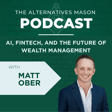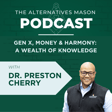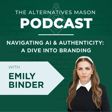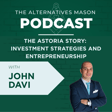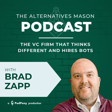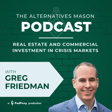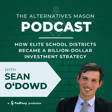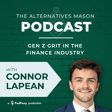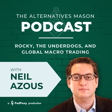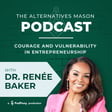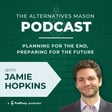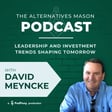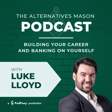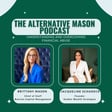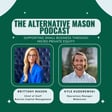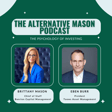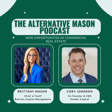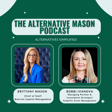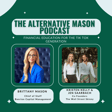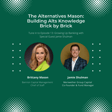Become a Creator today!Start creating today - Share your story with the world!
Start for free
00:00:00
00:00:01

The Alternatives Mason: Building Alts Knowledge Brick by Brick | Episode 29 | Commanding Wealth: Military Precision in Money Management with Dennis Morton
Join Brittany Mason in this engaging episode of 'The Alternative Mason' as she sits down with Dennis Morton, co-founder of Morton Brown Family Wealth and an army veteran with a background in history. Dennis shares his unconventional path into the finance industry, discussing the importance of humanities education, his transition from the military to finance, and the founding and growth of Morton Brown Family Wealth. This discussion serves as an inspiring reminder that the financial industry is not solely about numbers—it's about people, leadership, and the ability to continuously evolve in a rapidly changing world.
Key Takeaways:
- Human connection is paramount in the financial industry; understanding clients leads to meaningful relationships.
- Reinvention and adaptability are crucial for overcoming setbacks and seizing new opportunities.
- Alternative investments, such as private credit, offer valuable diversification and risk management options for clients.
- Foundational beliefs like "Reimagine, Simplify, and Thrive" can guide financial firms in crafting innovative and client-centric experiences.
Connect with us below!
Transcript
From Math Struggles to Financial Success
00:00:00
Speaker
Sometimes your biggest fear is actually your greatest calling, in my opinion. Yeah. And I really, it was probably four or five years into this business when I realized that my background, my educational background was actually a superpower.
00:00:14
Speaker
And it was just because I, i I saw all the people who were good at math in this profession and they weren't always good at results or being effective, being effective of what they're doing. And that's the whole, that's the whole gig in this financial advisory role. If you're not effective, if you can't communicate, if you can't have a positive influence on the people you're serving, you can get the math right all day, but you've got, you've got to have something else under, room understand the human side of it. That's where that's education.
00:00:42
Speaker
It's a relationship.
Introducing Dennis Morton
00:00:54
Speaker
Hello, everyone. I am Brittany Mason back to you with another episode of The Alternative Mason. And I am thrilled today to invite our guest, Dennis Morton. He's the co-founder of Morton Brown Family Wealth, an Army veteran with a background in history who took an unconventional path into finance. it He and his partner, Katie Brown, have built an award-winning advisory firm recognized for innovation and leadership.
00:01:18
Speaker
And Dennis was recently named Investment News 2025's Advisor of the Year in the Northeast. Congratulations on that. That is an amazing accomplishment. I'm so excited to have you on the show, Dennis. Thanks for coming. Thank you, Brittany. Appreciate it. Thanks for the nice intro.
00:01:35
Speaker
I am really excited to just dig in with you because it seems that you have a very unconventional path into the finance industry, as I do as well. A lot of our listeners are pretty diverse, so I want to just dive right in. It looks like your history your your history was more in history and um the military. I see you were you were in the army.
00:01:58
Speaker
did all of that start? Where did your journey begin?
Dennis Morton's Unconventional Career Path
00:02:04
Speaker
So yeah, I think I took one finance class in college and it was my lowest grade. i just had no interests. that like the The math thing, it just wasn't really where my interests lie.
00:02:13
Speaker
I had an ROTC scholarship, the Loyal in Baltimore, Maryland. And I just thought, well, I know I'm going to have a job because i have to serve four years in the army. So i I guess I can study what I want and then I'll figure everything else out later.
00:02:25
Speaker
So I ended up taking like just a classic liberal arts know degree path. And I didn't I wasn't exposed to financial advice growing up. I wasn't exposed to it in college. And it really, my first exposure to the world of financial advice is after I graduated. i was commissioned a second aut lieutenant and sent off to El Paso, Texas.
00:02:45
Speaker
And one of the first officers that I worked under said, hey, you need to get a financial advisor. And this is 1999. So you know what that meant. You need to get a financial advisor and go buy bunch of Fidelity mutual funds loaded up tech stocks, with dot com stuff.
00:03:00
Speaker
So everyone, I remember him, this officer, i remember him day trading during our lunch breaks, like just buying wwe WWE stock. And it was just, it was a hot thing to do. So I ended up going and meeting with an advisor and setting up like a Roth IRA and just got started a little bit, but there was a lot of like product and whole life insurance and all those things mixed in there.
00:03:19
Speaker
Fast forward a few years, I served my my time in the army. I was a Patriot missile officer, um kept accumulating some things and got out of the army and took a job in Pennsylvania working for an industrial company.
00:03:31
Speaker
And i hated it, didn't like it at all. And I had to, and we we had a wife and I were just married, we had a baby on the way and she's like, you're miserable. do you want to go back in the army? That's how bad it was. Like the army seems better than this.
00:03:42
Speaker
And she, to her infinite credit, gave me some space to discern what what I really wanted to do. You know, okay, so I've got this degree in history, I can write and communicate well, I've got some leadership experience, you know, shooting missiles isn't really practical in Eastern Pennsylvania. So what do you do with it?
00:03:59
Speaker
And right around that time, the the new financial advisor, got somebody in Pennsylvania to come out and meet with us. And he sat down and we started talking about, okay, we need to save for the baby. We need we have a mortgage now. All the things that had changed.
00:04:13
Speaker
And the guy could not have looked more bored. And he was he was a veteran himself. So he had some some background in common. And I just said, why is this guy so bored? And I realized he doesn't have anything to sell me.
00:04:25
Speaker
but we We're not there to buy buy a product. And after that meeting, I turned to Gina and I said, you know what, I think I can do that better. I don't know what that is, but I think that i think I could do that job because he's not it's it's not delivering on what my expectations would be.
Lessons from the Financial Crisis
00:04:40
Speaker
So I started applying to brokerage houses and somebody picked me up and said, we'll give you a chance. And it went from there. And ah when, so that was before the global financial crisis, correct?
00:04:53
Speaker
yeah So what was it like? yeah I mean, very different world, very different landscape. um You know? And so, I mean, when I came over to the financial service industry, I just remember learning so much about that time and how it just, it changed everything, you know, how we do business.
00:05:11
Speaker
What was it like being a rookie broker during those early years before all those changes? Yeah, so I i was a little bit of context. i um started in a town where I knew no one. So I i was from Baltimore. I lived in Texas. And here I am in eastern Pennsylvania.
00:05:28
Speaker
And I just started cold calling and i'm dialing. So it was great because you get to hear a lot of stories. And this is like 05, 06 timeframe. And I can't tell you how many times I heard people say, why would I invest in stocks and bonds, you dummy? Like, remember the dot-com thing? I got burned in that.
00:05:45
Speaker
um yeah all my money I'm putting all my money in real estate. And I heard it over and over again, like, and it was just, no, I'm not going to invest with you. i'm all And, but but being young and naive at the time, I'm like, oh okay, that's, that's a pretty good, pretty good point.
00:05:59
Speaker
And then, you know, great financial crisis happens and you just start learning the lessons. I think it was an amazing time to be starting out in this business because you, you did have, you couldn't pretend that reality wasn't going to hit you. And I say that in a couple of ways, like when,
00:06:14
Speaker
I was in the army, we went to war for a little bit and you know, you gotta kind of face your fears a little bit. Then starting out in this career, two years in financial crisis hits and it's like, this is real. Like the risk is a real thing.
00:06:26
Speaker
Yeah. And, um, but you you would just talk to people. It was really hard to get them to think about diversification or all the good things we know about being a prudent investor because they just wanted to put their money in anything but that thing that had burned them last time.
00:06:40
Speaker
Mm-hmm. So I'm very curious because you said when you were taking you know courses in school that you know you didn't you stayed away from ah more like finance and and math and and things like that, like that didn't interest you.
00:06:54
Speaker
That is similar to my experience as well. I always was intimidated by math and I didn't think I was that good at it. And so I never really thought the financial service world would be a place for me.
00:07:05
Speaker
And I found myself here by accident, and really by trial and error through other other businesses and other industries. And so um but one of the things that I found is that, you know, you don't really utilize the math in the way that most people think.
00:07:22
Speaker
you know and so that is just more of a self-limiting belief i think that a lot of people ah put on themselves and fall into that trap of self-limiting beliefs that oh finance is not for me oh i can't learn this that's too that's out of my repertoire because i just i'm not good at math well i think that it's something like that's a mentality that we all have to really work hard to to break because sometimes your biggest fear is actually your greatest calling in my opinion Yeah. And I really, it was probably four or five years into this business when I realized that my background, my educational background was actually a superpower.
00:08:02
Speaker
And it was just because I, i I saw all the people who were good at math in this profession and they weren't always good at results or being effective, being effective of what they're doing. And that's the whole, that's the whole gig in this financial advisory role. If you're not effective, if you can't communicate, if you can't have a positive influence on the people you're serving, you can get the math right all day, but you've got, you've got to have something else under, I mean,
00:08:28
Speaker
understand the human side of it And that's where that humanities education comes
Leadership in Finance
00:08:31
Speaker
in. Yeah. The human aspect, it's a relationship business. And so where did you feel your skills that you learned from the army came in? What do you feel gave you the biggest unique asset as far as your previous experience before coming into the financial service industry? It's funny you ask that. been thinking about that a little bit more recently than I have in a while, just because one of my ah One of my critiques of the financial advice industry is that it's really light on leadership.
00:09:04
Speaker
We have good salespeople, we have good product promoters, we have good advisors, but when it comes to leadership as it shows up with developing talent, with running organizations, with you know having just clear vision for for what firms are doing or career paths and everything else, I think there's a lacking lacking in that across the board.
00:09:24
Speaker
And when when I started in the Army, so you go through the basic course and then they put you in a platoon as a platoon leader. And I was a maintenance platoon leader for Patriot missile batteries. They were 30 some soldiers. And the first thing you have to do is learn how to shoot the Patriot missile system. You have to be technically and tactically proficient.
00:09:43
Speaker
So you know you're spending all this time in a classroom learning this technology and and becoming a good practitioner of the Army thing that you're doing. but simultaneously you're also leading 30 some soldiers and you're doing health and wellness checks on them on you know tuesday mornings and in the barracks and you're you're handling the personnel and promotions and you're you always had to be doing both it wasn't enough just to be a practitioner you had to be a leader and an effective leader And I think for a while I got into the, in this industry, I kind of looked around said, everybody kind of does their own thing.
00:10:15
Speaker
There's a lot of that, you know, I was in a wire house and everyone's kind of siloed out and um does their own thing. And there's not really a ton of leadership to get this whole thing moving the same direction. And then I found myself in the independent channel a few years later.
00:10:27
Speaker
And it was it was different but similar. that that wasn't You didn't have to be a good leader. I think where I am now, and I'm really grateful for being in this position with my partner, Katie, to to lead a team and to to lead a firm in this industry, because I love this profession, but I really relish both of those hats that I get to wear, the leader and the advisor, because each informs the other.
Founding Morton Brown Family Wealth
00:10:49
Speaker
And i think being both has made this a really rewarding career. That's beautiful. So you and Katie, what was, tell me more about the birth of Morton Brown. So was it all derived from that one specific experience with your wife and and your original advisor or it all directs back down to that and you're like, you know what, I can do this so much better. Let me just, was was it it was was it like an overnight thing? You're an aha moment.
00:11:19
Speaker
No, it was, it was actually 10 years in the making. So, so, um, I left, you know, 2007, um, I was actually cut from the brokerage firm where I was good for lack of production. I was building a fee-based business and I wasn't earning enough commission. So they cut me loose.
00:11:37
Speaker
Um, long story short, I ended up being hired by an independent firm where Katie worked at the time. She was already a partner there. And so I started there right in the financial crisis in 08. I just, I left wall street and went independent to an IBD firm.
00:11:52
Speaker
And um so I worked with Katie, but not near her. So I was kind of building my own clientele. She was working with the founder and principal and we just were kind of ships in the night for probably five or six years. We got to know each other and have a good relationship and maybe around 2014 or so um we started working on some clients together.
00:12:13
Speaker
We started realizing that we had very different, but complimentary skill sets. Like Katie had always done, you know, high level financial planning, run compliance and operations. I was more business development investments, lead advisor type thing.
00:12:27
Speaker
And we started going to conferences. we started seeing what other people were doing. like wow, I still got a stack of like moleskin books sitting over here, going back to like 2012, where I was just writing down all this cool stuff that people were doing.
00:12:40
Speaker
And we started thinking about implementing it where we were and met some resistance. You know, there just was not a lot of inertia. It was a lot of inertia and not really an appetite to do some of the really innovative things that are happening over the last 10 years in financial services.
00:12:55
Speaker
So around 2017, we said, you know what? I think we could make a go of this. I think we have, I think we have the talent. I think we have the the the timeline. We were young enough and I think i think we could start our own firm.
00:13:07
Speaker
And in 2018, we left. We took about 80 households with us and about $100 million dollars in assets. And we got to work. We just started doing all the things that we had been taught to do or learned from other people.
Challenges of Starting a Financial Firm
00:13:21
Speaker
And it's been amazing. So we're up to 270 households now and million seven years later. So it's been, I mean, a team of eight, just rock stars and just love it. So what do you feel was the hardest part of launching Morton Brown?
00:13:44
Speaker
lunch I think, i think one of the hardest, well, I'll say this. I think always staring at zero is hard. You know, remember walking in that moment, it was we call it we celebrate Call Day every March 27th. That was the day we walked in and we had a list of numbers and we could start calling people.
00:14:01
Speaker
And we are at zero. By the end of the day, we had a business. But um staring at zero, both when I was a new broker in 2005, 2006, doing it again when i left Wirehouse and doing it for a third time when we launched Morton Brown, there's never anything that's easy about that.
00:14:20
Speaker
But interestingly, when I've talked to other advisors, people who might be large RIA firms and thinking about going on their own, or especially people who are, um you know, the Wall Street channels and are like, well, I would never start my own practice.
00:14:36
Speaker
They're afraid of compliance or they're afraid of like the business management part. That part never scared us. We were never... And I think it helped that Katie and I worked together for 10 years. We kind of gone up through the hundred million to half billion journey before, and we had a good sense maybe in some respect of what to do and other aspects, what not to do.
00:14:55
Speaker
yeah So from day one, we've had a great functioning partnership where we've got each other's backs and we've kind of built in the running a good business part and knowing how to do that has, has I think kept a lot of the fears at bay.
00:15:10
Speaker
Yeah.
Core Beliefs of Morton Brown Family Wealth
00:15:11
Speaker
So building the foundation of Morton Brown, you know, that that's the most crucial part. What would you say are the three most fundamental beliefs for the foundation when it comes to the success of Morton Brown?
00:15:29
Speaker
words that sit on everybody's desk around here. What's that? green Reimagine, simplify, and thrive. Reimagine, simplify, and thrive.
00:15:41
Speaker
And the reason those three resonate with with us, and and we did this a couple of, a lot of this was just bursting out of our two brains when we were sitting down eight years ago, planning all this out. So we had words and language and everything else, but we've learned so much about ourselves and about this team around us that I think what we're trying to do is reimagine the experience that people have with a financial advisor. When they walk into our office, there's there's no big granite table, there's couches, feels like a living room. it's It's very not casual, but comfortable and easy.
00:16:15
Speaker
And we want to reimagine just that the culture that we build of of the firm, the highest compliment we can get is this doesn't feel like a financial like a financial advisor's office. This doesn't feel like the experience we expected.
00:16:26
Speaker
yeah And we constantly want to improve upon that, that re-imagining things is like it can be different and really evangelizing that. The simplified part is that I think our industry errs on the side of complexity too often. it you know just yes we still see We still see statements coming through. had one the other day, statements with nine pages of holdings, know a multimillion dollar account, no idea what they own. it's like Somebody's being paid for complexity. Very intimidating. Yes, it can be very overwhelming, very intimidating.
00:16:59
Speaker
And that's where for people like us who are coming in from the outside, we go, does it need to be like that? Like so somebody thinks this is them doing their job. And I'm thinking for a while there, I thought, man, I've got a lot to understand. And now I'm bold enough to say, no, they're wrong.
00:17:13
Speaker
yeah This is there's a simpler way to do this. And oh, by the way, if you can cut through that and get to the simplicity. then you're going to be more confident. You're going to sleep better at night.
00:17:24
Speaker
You know, is it the Oscar? Just coming back to the literature, Oscar Wildline. Sorry, this letter was so long. I didn't have time to make it shorter. It takes really hard work to make something simple, but that's the gig. That's that's our job.
00:17:39
Speaker
Yeah. um And the last part is is thriving. And, you know, Katie and I set out like in 2020, depths of the pandemic, we we decided we're going to get a BHAG, big, hairy, audacious goal. We're, you know, in 10 years, we don't want to wake up and say we accidentally got somewhere.
00:17:57
Speaker
We're going to say, like, what are we trying to do here? So we had a sort of big, hairy, audacious goal to get to a billion dollars
Work-Life Balance Initiatives
00:18:02
Speaker
in 10 years. And we were sitting like at the depths of the pandemic. We were probably at 130 million. that was a little bit aspirational.
00:18:08
Speaker
Yeah. But we thought about that and put together, like, what does that mean? How big is our team? We built an org chart. Like, what does that mean for how many clients are we serving? and really just kind of backwards planned off of this number 10 years out.
00:18:21
Speaker
But even then it didn't, it didn't quite click with us yet. And what we ended up doing was these we got to have something qualitative in here. Like we we both had young kids at the time and still do.
00:18:33
Speaker
And we thought 10 years from now, those kids are going to be in high school college or are off on their own. and We want to make sure we're enjoying the ride. So we put in place this sabbatical policy where after five years, every employee is eligible for five week paid sabbatical disappear, turn your phone off.
00:18:52
Speaker
Don't check email. that is That is tremendous. And it's so unheard of. I feel like for an American country or American company to do that, you know? Yeah. Yeah. I feel like in Europe,
00:19:05
Speaker
I actually used to live in Ireland and they all take a month off at the end of summer. Like it's just part of the culture. They take a whole month off. Yeah. It just depends. Is it June, July, is it August?
00:19:18
Speaker
so But it's, it's really incredible actually. And I think, you know, it is important for everyone's mental health and workflow. If they, you know, if they're having a ah good work life balance, you know, because in the end, what are we all doing it for?
00:19:35
Speaker
you know, Yeah, it's very true. We did. fact, we just one of our advisors just got back from his five weeks sabbatical on Monday. So we've been catching up with him all week and hearing hearing his stories about traipsing around Europe and and everybody does something different. i mean, well, we're on different seasons of life and family situations and everything. But um I went first, which.
00:19:53
Speaker
Yeah. was hard, um but we had to set the tone. Katie and I went first and saying like this, we're going to take breaks. Founders of the firm are going to walk away. And we did it different times.
00:20:05
Speaker
Was that scary at first? Was that scary at first? I'll tell you funny story. So i my family took our sabbatical in 2023. were so and were we're to rewind to November of 2022. And we're meeting with our business coach, who's been ah indispensable to us.
00:20:24
Speaker
And he's like, okay, let's talk about goals for next year. So we're talking about, you know, AUM goals and we're talking about building the team and all this other stuff. says And he says, you know, we, um, any, anything else big on the horizon and Katie like nudges me, she goes, you're so oh yeah, I'm taking a sabbatical next year for five weeks, just like we talked about a few years ago.
00:20:48
Speaker
our coach goes, great, when are you going and where are you going? And I went, I don't know. I haven't written it down yet. We haven't talked about it. He he says stop right there. Before we go anywhere further.
00:21:00
Speaker
So you're telling me you've worked so hard to get this five-year sabbatical, you're going to be setting the example, and you haven't even put it on the calendar and communicated that to your team? I went, huh, you're right. and it's and And at this point, it's like six, seven months away.
00:21:14
Speaker
So um he said, by next week, you need to have it on your calendar when you're going and have a sketch of of what you're gonna but you're gonna do. So I did that and started planning, but it's it's this whole thing of like, you gotta take care of, you the whole point is to take care of yourself. And I wasn't doing that.
00:21:29
Speaker
I was like, oh, that that'll be, I'll take care of myself later. Later. Then. Yeah, and it turned out beautifully. Like we took, we have four kids. We went to Europe for a month and just ran around and had a great time and and came back ah i don't know if that's refreshing. don't if i came back refreshed, but it came back having learned so much about my family and learned a lot about the, I think thought everyone has learned so much each time someone goes.
00:21:53
Speaker
We learn lot. Like we said, this is a, people think that this is um ah a business where you have to be amazing at math. and you know, like both of us, we were both very intimidated because of that very reason. But the truth is this, this is a people's business. This is a, you know, yeah you're really, it's a relationship business. And I have always felt that the more you travel, traveling is the one thing, you know, where you can spend money and come back richer.
00:22:26
Speaker
Yes. Yes. Yeah. It was, it was an, it was an awesome experience. and I think everybody's going to come back and you know what other thing clients loved it. they They just, they thought it was the greatest.
00:22:37
Speaker
And it also helps us to turn around to them and say, by the way, um we spent money on experiences. We invest in our own experiences and our quality of life. We're go to talk to you about that too. Like don't, you can't take it with you. Like mine,
00:22:51
Speaker
the The most valuable thing I spent was my time, like the time with my kids at the age before they go off to college, know, they're still, you know, high school and younger. And i'm not going to get that back. I can't save more and do it in 10 years.
00:23:04
Speaker
so yeah kind of So you kind of build in that urgency. And I think it's helped our client conversations too.
Client Engagement and Trust Building
00:23:09
Speaker
So you said your clients loved it. And what type of what do you feel is the best fit? What type of client is the best fit for your for? for the Let me say that one more time.
00:23:20
Speaker
What type of client is the best type of client that you feel most fitting for your firm?
00:23:29
Speaker
think it's. This is word psychographic. I think it's a, it's not a demographic profile. It's not an AOM profile. It's a psychographic profile. It's people who are ready to be intentional. If there's one common theme, it doesn't matter if you have, you know, million dollars or $10 million. dollars if If you're not ready to like be purposeful about it, we're probably not a good fit because we're to talk, we're goingnna have some, some great conversations, sometimes hard conversations.
00:23:56
Speaker
And we're going to put in the work. If you're just looking to park your money with your buddy and beat the market every once in a while, but that's, that's not. Engaging for us either. So I like, and sometimes we'll have people kick the tires on Orton Brown and say, I don't think I'm ready to do that yet.
00:24:12
Speaker
And we've started to learn why, because then a couple of years later, they'll boomerang around and say, now I'm ready. I always had you guys in mind, but now is the time where my spouse or significant other are ready for it. My family's in a different place. I have more certainty around my job.
00:24:26
Speaker
But we think people who the hardest relationships are the ones where they don't want to do the planning work. They don't really want to understand the why behind their saving and the money and and just more is the answer.
00:24:37
Speaker
that Those are difficult ones. But if they want to be intentional, I think we're a really good fit. Finding someone's why is the key to everything. Isn't it though? It is. It really is.
00:24:48
Speaker
So how do you build that trust within those relationships with your clients? do you have a special approach or a unique approach philosophy wise? Yeah, I think, i think a lot of it has, has to do with presenting ourselves in an authentic way. We've done,
00:25:07
Speaker
um One of the things that i really would have discounted, if you told me this seven years ago, that we would have a presence on social media, particularly LinkedIn, the way we do, um i thought that was crazy because we didn't do much of it.
00:25:18
Speaker
yeah But we had to to establish ourselves pretty quickly, not just who we are when when you know the doors are closed and we're here in the office, but who we are out the community, what what our values are, what matters to us.
00:25:30
Speaker
And I think i feel like we've done a good job of presenting ourselves out there in the community the way we you know do we do our podcast, we do newsletters and communication. and I think what you see is what you get here. And that's and that's not just us. That's like our director, John, our director of financial planning, or Karen and Allie, or a client service.
00:25:51
Speaker
90 of us are marketing. Everybody is just... I think they've all come from somewhere where they were hit the ceiling of what their potential could be. And they've come here and can be themselves.
00:26:01
Speaker
And I feel that way, me too. Like this is the place where I've kind of become my best self. And um I think that comes through. So when somebody has seen us on social media or read something that we've written and they come in, it's like, wow, this is kind of how we expected your office to look, kind of how we expected a conversation with you to be.
00:26:19
Speaker
And and that's been that's been a big trust builder. Beautiful. when you're When you have to have difficult conversations with those clients, what type of mistakes are would you say you see most often where you would need to have a difficult conversation with your client?
00:26:40
Speaker
What type of mistakes would you see most often? That the advisor makes? That the client would perhaps make where you would have to help redirect.
00:26:54
Speaker
goals One of my favorite stories from the last couple of years, and it's changed a lot about how we how we talk to people. I had a client couple who, for i've worked with them for probably a decade, and for many years it was all it was a very much, what have you done for me lately? What's the latest performance? how are we you know Are we up or are we down? And you would you would get pretty direct with me when we come into meetings and and pepper me with questions and could be could be critical at times.
00:27:22
Speaker
and I would, we'd talk about the investments, then we'd talk about the plan, or plan and the investments. And I would show them how, what great shape they're in. But it would always do this cloud of performance, like, couldn't we get a little bit more, couldn't we get a little bit more here?
00:27:37
Speaker
And i kept holding the line, and like, but your plan says you're fine. And then um his, their kids had come on as clients, so they were business owners and they'd come in and met with us.
00:27:50
Speaker
And maybe a week later, the parents came in. And we started going through the same thing, talking through performance. And he said, Dennis, can we pause for a minute? And this is the husband talking. He Dennis, can we pause for a minute?
00:28:01
Speaker
said, sure. He goes, um my sons were in here a couple of weeks ago and they went through their planning and they came back and they talked to us a little bit. And in the course of the conversation about how confident they felt about their own futures, we realized they're going to be fine.
00:28:16
Speaker
I've been worried for so long about passing on my wealth to my kids because they're going to need it. They need us. They're going to be great. And um i think I think we can start spending our money. And he almost, he he started tearing up And I closed my laptop, like loudly, closed my laptop, set it down. I said, I've been waiting 10 years to have this conversation.
00:28:35
Speaker
Just because it was always, we can never get past the performance bogey to get to the real part of it. How can this money be used for my wife and I, our family, our grandkids to enjoy our best life? Yeah. And it's complete, the last two years, it's completely different conversation about how do we use this?
00:28:53
Speaker
Are we enjoying ourselves? And these are our good, these are the good old days. um Yeah. And I think that's and that's great. So then it's not a mistake. It's just a fixation yeah on some the stuff that I think our industry puts out there. It's like, look at past performance. Look at what happened today. and And I think our job is to pivot and say, oh, what's it for? The human aspect. What's it for?
00:29:11
Speaker
Bring it back to the human aspect because we can look at the numbers all day, but the why is is crucial to everything.
Investment Strategies and Education
00:29:20
Speaker
Yeah. So let's shift gears a little bit. So alternatives, let's talk a little bit about alternatives.
00:29:26
Speaker
eleven How are you you utilizing them at your firm? Interestingly, this is a timely conversation because well we our clientele is very... maybe unique to some to degree, our geographic area has very little kind of major corporate presence. So you're not finding executives or you know large 401k plans. or There's some, but it's a lot of small and mid-sized businesses, which has been fascinating for the role of particularly private equity coming in and gobbling up a lot of these smaller businesses. And you've seen a lot of names moving upstream. It's been a fascinating time to witness alternatives playing out in the real economy around us.
00:30:03
Speaker
um But it also means that our clients typically have large illiquid positions on their balance sheet, closely held positions that, you know, alternatives historically, we didn't build out much around them because that was their, they already had something that resembled that in in their balance sheet.
00:30:23
Speaker
Recently, we're we're in a deep education process right now, educating our clients on the role that alternatives play right now. ah the role they play in their income strategy, the role they play on their growth strategy, and making sure they understand why we're introducing these concepts to them.
00:30:38
Speaker
And i think sometimes we talk out of both sides of our mouth. And I don't know how you feel about things. that they They see the news on are alternatives coming to 401ks or yeah constantly being, they're being pitched one thing or another by their buddy on the golf course. And and we're we're we're talking about there's a role that these investments can play for you.
00:30:55
Speaker
By the way, we're going to build a really high wall for them to get in. Yeah. Like it has that has to be right. And that's that's the trust element to say, like, we're going to be very intentional about how we introduce things and the way we talk about it. So we've we've been working with our our CIO team just to talk with clients about how these are positioned and where we might use them to add diversification or alpha. Mm-hmm.
00:31:19
Speaker
how do you ah so How do you explain the risk and liquidity trade-offs for alternatives to your clients and to our listeners? Yeah, the risk of liquidity trade-offs are are interesting because, well, this is a fascinating time for the psychology of the markets.
00:31:38
Speaker
Like these 15 plus years of 15% returns in the S&P has everyone a little bit doped up on on just what everything. And we we say, one, one we're not trying to catch the last trend when it comes, you know, when it comes to risk taking, we're trying to manage risk looking forward. One of the things that i'm just, don't know if concern is the right word, but um it's just been a long time since we had a recession, since we really washed stuff out, you know, going back to the great financial crisis. I thought 2023, I honestly thought 2023, we were...
00:32:11
Speaker
we were Wasn't it? Yeah, that was the time when it it could have happened. So I think when we when we talk about managing the risk and liquidity, so take a business owner that's just recently sold a stake in their business or the whole thing, is that, okay, we have this liquidity that's that's high ground for us.
00:32:29
Speaker
We're going to be introducing potentially some things that have you know some illiquid potential, but they're going to be risk managers for you. they they they They're going to occupy a particular sleeve, and it's going to replace some of the things maybe that you had when you owned the business, but we're going be able to build around it in a way that keeps you you know flexible and you know in a good spot if and when the next you know tide goes out.
00:32:54
Speaker
And then that's what I think we want to position people for is to make sure that but your liquidity is hard earned. And to the extent we trade it, it's to to be very precise in what we're trying to solve for.
00:33:06
Speaker
What are some of your personal favorite alternative types of investments? What do you think people should be paying attention to these days? i Well, i'll I'll start with one one I'm not crazy about, which is real estate.
00:33:21
Speaker
i just I just think that that's that's something where, ah as as a firm, we're trying to stay away from a bit. ah Private credit is most interesting to us, specifically because I think... Well, here's here's a good point.
00:33:36
Speaker
I think private credit, because it helps us to explain bonds even better. because we have one of the things we've encountered among we and we have a retail clientele so you know it's a wealth management firm for so many years we talked right past people that they actually understand how bonds work and fixed income side so when we talk about private credit to people and explain just how it's functioning and and the space that it occupies in the pantheon of fixed income investments it helps them to understand the rest of their fixed income as well because when people talk about the market
00:34:08
Speaker
they They're just constantly looking at the stock side and don't understand that other part that's over there. So i think private credit, those have been some really good conversations and something. We also think it's a great entry point for people to understand some things like illiquidity and risk that are going to be introduced.
00:34:25
Speaker
So is that where you're seeing the most opportunities as well? I think so. Yeah. Yeah. It's it's really where. where I think our clientele is finding itself the most comfortable.
00:34:36
Speaker
So there's there's you know kind of that thing about the recession's coming, the the recession's been coming for 10 years. um yeah so we're We're finding people to be a little bit little bit skittish. So I think when you can talk about having adding some diversification and ballast into their portfolio, they like did they like hearing that.
00:34:54
Speaker
What is your opinion on ESG?
00:34:57
Speaker
what do you what is your opinion on yes ge and impact investing. ah You know, I've, you know, ever it was really hot for a while and then I feel like it's cooled off.
00:35:12
Speaker
What are your opinions on it as of now? Yeah, we've, There was a period of time where we had people asking for more. We really don't hear much clamor for it anymore yeah among among our clients. you're You're right. It's kind of ridden a wave and we were doing more of it maybe a few years ago.
00:35:30
Speaker
Yeah. um I feel like the space was just inundated by so many different strategies that it was hard to pin down what what exactly was happening.
00:35:41
Speaker
yeah I don't know. It's hard to explain. Even as an but as an advisor, as somebody who's been in this business for 20 years, and I'm trying, finding it hard to like bat away all these different concepts that are being, you know, shoehorned into the ESG umbrella. That's a mixed metaphor, but um you know what i mean?
00:35:58
Speaker
and then And then all of a sudden it felt like it went poof. And suddenly it's it just, you know, hit up against a brick wall. So I don't know. We just don't, we don't have too much demand for it. Um, One of the things that we've always tried to do is help people understand what it is that you own.
00:36:13
Speaker
You know, even when you talk about what's in an ETF or what's in a traditional mutual fund, you know, people say, should add more Nvidia? Well, let's crack open your index fund over here and i show you how much you already have in there.
00:36:24
Speaker
and <unk> And same thing goes for ESG. It's like, let's make sure we can crack this open and understand what it is that you own, what it is that you won't own. And are you comfortable with, with that
Recognition and Future Plans
00:36:34
Speaker
strategy? so
00:36:37
Speaker
So you were recognized as advisor of the year in the Northeast. Tell me more about that. Congratulations. Thank you. Thank you. It was, it was wild, uh, experience so yeah being in Manhattan with my wife and my business partner her and and her husband.
00:36:53
Speaker
Um, and, uh, it was actually really cool because we were nominated for two awards. It was the, uh, advisor of the year in the Northeast and also i team of the year for under 10.
00:37:05
Speaker
And, um, that The individual work came up first and and that kind of, that throws through a little bit. And we're in we're in Midtown Manhattan and it was, it was, we're all dressed up and it was, it was really a fun time. And then Katie leans over to me and she goes, you don't think they double down, do you?
00:37:20
Speaker
And then, you know, 45 minutes later, right before they announced that the RIA team of the year, she was over, she goes, we got this. So it was, but it was very cool. It's a cool validation for the team structure and the reputation we've built and and just just and a nice time.
00:37:35
Speaker
you it's It's funny though, we were we're in Midtown Manhattan for for that day and and my wife and I when was the last time we stayed in Midtown? And we realized it was 20 years ago before we even had kids and had gone to see the Lion King on Broadway. Oh my goodness.
00:37:52
Speaker
and I was like, I think I know when that was because we still have the Christmas ornament that we bought at that time. and We have the tickets in there. So I went home. Turns out the last time we were in Midtown was October 15th, 2005. And that was the first week I started as an advisor. Oh my gosh. How full circle is that? 20 years later and like three blocks away. How full circle is that? is that?
00:38:15
Speaker
it was it was cool I love it. when I love it when the universe gives you a little wink and it's like, yep, you went in the right direction. Good job. That's amazing.
00:38:27
Speaker
So when it comes back to what you see the future for Morton Brown, what you know, taking taking that back to the firm, that's a huge accomplishment. You guys have done a lot, you know, and in the past, you know, seven seven years, correct?
00:38:43
Speaker
Yeah. your ben Been around. So what's next for you guys? How do you see you carving out ah more space in the industry for Morton Brown?
00:38:54
Speaker
coming in I think it's, I think it's a fascinating time to be where we are doing what we're doing. kind of In the size that we are kind of approaching half a billion, still the two founders running the firm, fiercely independent, you know all the mergers and acquisitions that are happening and the cultural shifts. I mean, even more, anymore in our community, there aren't that many firms that are still kind of fully independent, but don't at least have some backing or partnership or alliance.
00:39:21
Speaker
outside. we We love that. Like there's just so much creativity that kind and hope that comes through in in this conversation because we just love the creativity of building a business and we're hiring two new advisors now.
00:39:33
Speaker
I love the hiring process. I just can't wait to see what comes through the door. And um because I guess it all of us came from somewhere where we'd hit a ceiling and there are limitations and we've kind of created our own runway for each other.
00:39:45
Speaker
And I'm excited to see where that goes. I think it could be, it is going to be really cool. going to have fun. What type of people are you looking for to work for Morton Brown? You know, as you build and grow and you're doing more hiring, what would you say that you're looking for the most in someone to come work for the firm? I'm going to start down the CFP track with two years of experience, that type of thing. i think you're looking for more of a like, what's what's this person like?
00:40:13
Speaker
like Who is this who who is this you know person walking through the door? I think it's someone
00:40:21
Speaker
who's willing to be kind of an agent of change. Like maybe, I love the idea of someone who has maybe spent a couple of years somewhere saying, no, this isn't it. This is not, I think it could be done better.
00:40:33
Speaker
I think there's a calling. Maybe they've tuned into some of the great voices out there in the industry and be like, I wanna be part of this movement to make this industry the best profession it can be and has a little bit of a chip on their shoulder.
00:40:46
Speaker
I like that. I
Overcoming Self-Limiting Beliefs
00:40:48
Speaker
like that idea. I think everyone here could tell their backstory and say, yeah, I was ready to go somewhere. A chip on their shoulder. I honestly love that you said that.
00:40:57
Speaker
So um that actually reminds me, the very first finance conference I ever went to was Jolt. And think great Manish Kata, he his he actually spoke and yeah I remember this quote and it's stuck with me ever since.
00:41:17
Speaker
He said, chips on your shoulder create chips in pockets. And it's really stuck with me ever since because i mean i found myself in the finance industry is because i lost I actually lost my business during the pandemic. I was in production. I used to run from Ireland and miss indiana usa it was my whole life and um i ended up losing everything and i was like okay back to square one having to start my whole life over what am i going to do uh i knew i was going to go into finance or law and um but i had quite a big i had a chip on my shoulder i'm not gonna lie you know from losing my business losing everything that i spent you know decades building
00:41:58
Speaker
And so, yeah, I had a real chip on my shoulder coming into the financial industry. And, yeah, i felt like I had a lot to prove because I had like yourself, I had no background in this at all.
00:42:12
Speaker
And it was, I had to really overcome those self-limiting beliefs in a huge way because I just I believed this negative self narrative that I wasn't smart enough. And oh, because of my background in fashion and entertainment and modeling, how could I ever go into the finance industry? You know, some like I wasn't good at math. How could I ever do this? And so I felt like i had a lot to prove.
00:42:37
Speaker
so i kept my head down you know and passed all my my exams on the first try um you know so really proud of that and so one of the biggest messages that i want people our listeners to take away when they listen to this podcast is really that you can do anything you want you know it all comes down to uh you know that self that self-belief and be careful yeah be careful the narrative that you're told and what you're believing about yourself it's never too late to reinvent yourself never too late so absolutely agree absolutely agree and i think it's the but some of the best stories are not just people who are running away from something but they know what they're running away from and what they're running towards once you figure that out it's it's just a powerful combination
Fostering a Supportive Culture
00:43:24
Speaker
Amen. I feel like, you know, we all have, you know, setbacks are really realignment and its recognizing, I think, the opportunity and a setback. It actually can be something that can just propel you in an entirely different ah path and look where you are now. I mean, that's amazing.
00:43:48
Speaker
So what do you personally do to overcome, ah you know, perhaps self-limiting beliefs? You know, I love this aspect of like the chip on your shoulder.
00:43:59
Speaker
and because One of the things I also say is never a victim, always an alchemist. and And that's what I mean is looking for the opportunity and something and trying to flip the script on it and and change that perspective for it to work in your favor.
00:44:17
Speaker
So do you have a I don't know, like a philosophy? How do you overcome those sort of self-limiting beliefs in yourself?
00:44:28
Speaker
Well, one, I think necessity is the mother of invention. So, you know, similar to your story, you lost your business. Like I was, i was fired from my wall street job and had to go find something else. Um, and, uh, so when we're around the time, I think we have one-year-old and that, that was, that's, that's hard. So you find that, you find that motivation, but I also think.
00:44:50
Speaker
I mean, it's not a motivation, but it's something I've learned about myself is that at heart, um I have a performer streak in me. I'm a guitar player, like playing music in front of people, like giving speeches. There's just something about being the high wire act of performance that I really enjoy. The pressure. I like the pressure. like the pressure.
00:45:13
Speaker
and you yeah so it's um it's good i think it keeps it keeps my edge a little bit and i also think that that's helped in situations you know you need to go meet these you need to meet new people you need to establish connections you need to build relationships you you know just order the business decisions and And um I think that sense of being on is I like it.
00:45:37
Speaker
And now turning it off sometimes that can be challenging. You have to find your sabbatical. That's why those sabbaticals are so important. Yeah. Yeah. But I think think that that's where kind of channeling it through like every client meeting. How what is what is the most effective way to deliver this? I have to have to deliver this presentation, good listener, the rapport.
00:46:00
Speaker
um that you establish in in a conversation and making sure that you're you're doing, you're saying the right words are coming out at the right times to be as effective as you can be. How do you motivate, how do you use, how do you use those, that approach as well to motivate, you know, your employees, perhaps when they're having ah you know, a rough, a rough go, a rough day and they don't know how to move forward with,
00:46:30
Speaker
you know, a challenge. How do you re-motivate them and get them out of their own heads? I think it's really hard to do in the moment. i think the best thing we do is give them a lot of autonomy.
00:46:43
Speaker
that's been That's been an epiphany in the last couple of years is just realizing and then not micromanaging and yeah. Yeah. And it started for me probably around the time of the sabbatical where it's like, okay, going to go away and and it's going to be fine. I'm not the indispensable person anymore.
00:46:57
Speaker
And I think Katie and I not like working over them and micromanaging or just trusting that they're going to do their best work um has really empowered them a lot to the point where I think there's ah there's there's a chemistry that no one gets too far down because there's there's a lot of we got your back.
00:47:17
Speaker
And we've sensed that. It's really palpable. like When we do our quarterly offsite, our team tells us that. We'll solicit feedback from them. the week They say, we love the culture and the autonomy that we have Um, to, to try and there's that word thrive here.
00:47:33
Speaker
I feel half the time it's really just knowing, like knowing that someone has your back, you know, that they can't, that if they need help, they can just go to you and have an honest, transparent conversation.
00:47:46
Speaker
um yeah, that's in keeping that, that open means of conversation open, you know, feeling like they have real support.
Recommended Resources and Learning
00:47:58
Speaker
and We're learning on the fly. Like this is this is all just, we're we're building the bicycle as we're riding it. So anyone out there that's listening that, you know, would be interested perhaps in breaking into this industry or learning more about Martin Brown and alts and what you're doing, private credit, where what are some good resources that you would recommend?
00:48:22
Speaker
Some reading materials, perhaps podcasts?
00:48:27
Speaker
I think some of um' I'm a content junkie. yeah I think some of the, you know, I love but my most reliable one. I love the odd lots podcast from Bloomberg.
00:48:37
Speaker
Joe and Tracy just do do a phenomenal, I refer that to clients sometimes saying, you know, if you think the market's weird, go a little bit deeper in some of this and you just start to understand just all these, you know, little corners of places and how, and that's always fascinating when they go to conferences and you realize just how many people are out there in in small sectors of the market, you know, doing things that make money. It's it's very interesting.
00:48:58
Speaker
um um um I'm a big book reader, so just everything from some of the random walk down Wall Street or other things. I think one of the best things you can do is here's the history major coming through.
00:49:12
Speaker
Understand your history and your perspective, like get a fundamental foundation of what came before. You know, ah love to ah Ron Chernow's JP Morgan biography, just learning what fuck what finance was 100 years ago.
00:49:24
Speaker
um get Get some of that foundation. we We're not taught that. I studied history. I was definitely not taught the history of finance. So kind of going back and realizing the the overlay that existed through all the last 100 years and how money played into it.
00:49:37
Speaker
get that foundation and then find the current voices that you like. um Because they'll all start to make sense once you have the context of here's how the markets function, here's some of the history of money.
00:49:48
Speaker
And it it can be, you know, don't back too far, but just read some of the best books, any list of the best financial books from the last 20, 30 years. And you'll, you'll be and a big headstart on people.
00:50:00
Speaker
The evolution of the industry in general. That's great advice. What about any documentaries that you would recommend? Any documentaries movies or I know when I first started, I watched, you know, margin call and, you know, I watched like, you know, all of, um, know, I watched a documentary on, um,
00:50:20
Speaker
you know i i love american greed ah love american yes yeah yeah yeah i don't know that habit although i do i'd never seen the original wall street until after i started in this business like i was i was so naive i haven't you know i have not watched the original wall street either i have not actually i need to see that i need to add that to my list yeah so i i eventually did watch it probably like 2007 2008 but um yeah margin margin call is a good one i just um I think one of the best, coming back to advice for someone, multidisciplinary learning.
00:50:56
Speaker
I really do think you've got to be able to relate to people. And and there are things that you're going feel, whether it's sports or whether it's fiction or whether it's you know just... wherever you might find it, find some way to relate financial concepts to other things. Give people another point of traction that that when you talk to them and you have to think in a multidisciplinary way, like I said, you can get all the math right. You can get all the dollars and cents right.
00:51:20
Speaker
Yeah. But if you can't find a story that's relatable to them, you're right. You might, you might not get through. It's like you're taking, exactly. It's almost like you're just talking to a wall or a robot or something. You've got to find that human connection.
00:51:34
Speaker
That was a book that I read a couple of years ago on, it was written by a guy the New York Times. It was on this, the towel, the backup catcher. And it was all about backup catchers in baseball and how they frequently become some of the best managers and the nature what that job is, what it means to be a backup catcher. it's a horrible job.
00:51:52
Speaker
um You're just, it's a real grind. But it just had a lot to, I related it back to to finance because it's not glamorous.
00:52:03
Speaker
You're learning a ton. You're watching everything. You always have to be prepared. And we just related it back to that. I even wrote an article for CNBC a couple of years ago when the drummer for the Rolling Stones died. And I wrote, here's what we can learn from Charlie Watts, 50 years behind the kit for the Stones.
00:52:17
Speaker
And it's just, you find these things that are just you know cultural touch points that can be related back to finance. And I think that's helpful. Yeah. Yeah. Cultural references.
Closing Remarks and Contact Information
00:52:29
Speaker
That's great. Thank you. I have really enjoyed this episode. Thank you so much for taking the time to chat with us. Is there anything that you would like to leave the listeners with and where they can find you LinkedIn is the best place. You can look at Morton Brown Family Wealth on LinkedIn or or my profile. It's our website, mortonbrownfw.com. We do a lot of writing and communicating and just get a sense of kind of how we're showing up both as a team in our community and in the industry. So happy to connect.
00:52:58
Speaker
I love it. Thank you so much. Thank you for taking the time to chat with us today. Thank you so much, everyone who has tuned in to listen. i am Brittany Mason from Bonnerian Capital. You can go ahead and give us a follow as well on LinkedIn, Instagram, X, wherever you consume your or finance education. And we are looking forward to the next episode. Thank you again, and we will see you next time.
00:53:27
Speaker
The opinions expressed in this program are for general informational purposes only and are not intended to provide specific advice or recommendations for any individual or any specific security. It is only intended to provide education about the financial industry.
00:53:42
Speaker
To determine which investments may be appropriate for you, consult your financial advisor prior to investing. Any past performance discussed during this program is no guarantee of future results. Any indices referenced for comparisons are unmanaged and cannot be invested into directly. As always, please remember investing involves risk and possible loss of capital.
00:54:02
Speaker
Please seek advice from a licensed professional.
